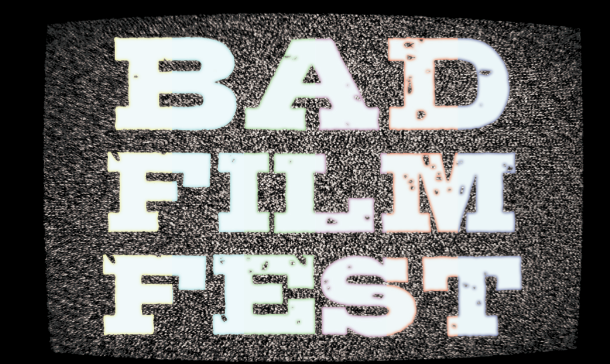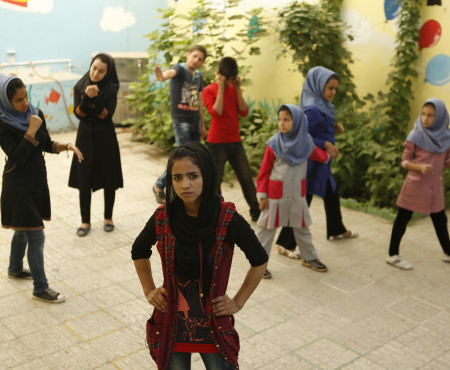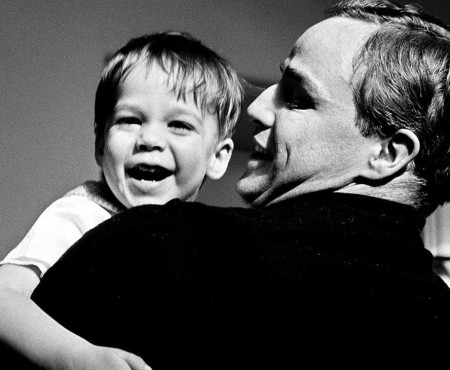Regardless of the perspective from which one approaches cinema, the idea is—be it intellectually or viscerally—to have a good time. This is possible whether the movie in question is the highest, most exalted work of art, or the most disreputable of genre movies. This is to say, good movies are enjoyable because they’re good, but many hold that bad movies can be enjoyable precisely because they’re bad. Movie Mezzanine recently sat down with Shawn Wickens and Gavin Star Kendall, the founders of New York City’s Bad Film Fest, running April 18-21. Bad Film Fest is Wickens’ and Kendall’s followup to last October’s successful Bad Theater Fest.
Danny Bowes: What were the origins of Bad Film Fest?
Shawn Wickens: I think, even before I knew the theater festival was gonna do well, I thought I’d buy the “badfilmfest” domain name.
Gavin Starr Kendall: And I was like, yeah, let’s do THIS.
DB: One thing that you were mentioning, about people getting a little wary about the idea of “bad.” But it seems pretty clear that you two really don’t have a very pejorative to, when you start with “Bad Theater/Bad Film Fest.” It just like, I mean, not to get too egg-headed here, but just talk a little bit about, philosophically, what that MEANS to you guys specifically when you conceive of “bad” theater or “bad film” in the context of these festivals, is there a particular aesthetic that you’re looking for, or like a particular like umbrella covering various different kinds of . . . just talk a little bit about what that means to you guys.
GSK: For me it was, it’s funny how like I would come up with those justifications, like as the process went, at first saying like bad theater bad film fest whatever, then later going, well, it happens to feed into this, I kinda found some little philosophies later on as we did it, especially with what “bad” means, and the fact that we do just let it mean anything, it can mean—obviously we’re not, I don’t really want like HORRIBLE work or anything like that.
SW: Yeah, we’re not looking for any sort of like—
DB: You’re talking about something that would fall under the heading of what people would call “good-bad.”
GSK: Yeah, yeah, yeah, like bad as in good. Or unfinished. Or, y’know, first-timers. Sometimes it’s like yeah, the first time you’ve written something it probably wasn’t so great.
DB: You’re talking about more artistic and creative freedom than the idea of being hemmed in by the idea of the “well-made play” or the “well-made film.”
GSK: Exactly, exactly. And that kinda came true [in Bad Theater Fest], in that we had this woman that we actually thought was from China (Shawn laughs) but she wasn’t.
SW: Well, she is, but she lives here now.
GSK: We’ve asked for people’s hometowns and they gave them to us, where we really meant “where are you living now?” So anyway, she’s an actress and she’d been doing all these Google searches on the phrase “32-year-old woman” and she submitted a show to us. She had like a year of them, just gathering research.
SW: Just like news articles that had the phrase “32-year-old woman.”
DB: That’s such an amazingly specific thing.
GSK: So she somehow developed, she had some show developed then submitted to us, but then later, before the festival, she said, “oh, this is changed, I’ve now written like an actual play and I’ve cast it with these other women.”
SW: Originally it was just going to be her reading some essays.
GSK: Yeah, and then it turned into—and this was the first time she’d ever written anything or directed anything. She was mainly an actor. And so it was like, oh, perfect, you were exactly what we were kinda like going for, in a certain way. Someone who didn’t have, or maybe wouldn’t have this chance beforehand to do this idea, to get this idea up on stage.
SW: Mainly this weird range of things where it was like, people who had never written anything before, sometimes it was people who had written other stuff but this was something that had been shelved. We had people who had written something specifically for this, like “oh, Bad Theater Fest, I’ll write something.” Or it was like people who had done productions before, and they were like I’ll do a loose presentation of it here.
GSK: Instead of trying to define what “bad” meant, it just, we just let it mean open creativity. And where a lot of it didn’t end up being bad at all . . . I mean, some pieces weren’t as great as probably any of us hoped and stuff, but there were some where it was like, “oh, wow.” Like one of our friends who did a show, she’s been putting it up at the [Magnet [link]] Theater recently, doing other productions of it. Kind of workshopping it and stuff.
DB: It seems like the sort of thing that like, y’know, getting past the notion of being “bad” as being pejorative and looking at it in this more expansive way seems to, you know, that if you can encourage people to think of it that expansively, you can attract the kind of work that you seem to be looking for. But that raises the question, do you worry at all about—I mean you don’t hold the term “bad” in this instance as a negative—but do you worry about that limiting submissions? People just looking at it all, “Bad films? I don’t make bad films, I’m not going to submit anything to this.”
SW: I think anything we would have named it would have limited it somehow. Like, I used to, prior to moving to New York, I worked with the Ohio Independent Film Festival. I kind of didn’t even think about that experience when I was talking to Starr about this, hey, let’s do a theater festival . . . oh, yeah, I kind of have been behind the scenes of a film festival. (laughter) So, Ohio Independent Film Festival, based in Cleveland, Ohio. There are people who will just not submit their film, cuz it’s like, I’m not gonna submit, it’s in Ohio. You know what I mean?
DB: Kinda provincial and unfortunate.
SW: Like the Fringe Festival. I’m sure there’s people who don’t, who are like, I’m not going to submit to the Fringe.
DB: “The FRINGE? I’m a MAINSTREAM artist.” Yeah, I see your point on that.
SW: I think anything we name it, whether it was some sort of regional or some derivation of quality, by the fact that we’re opening ourselves up to this, we’re by definition sort of closing ourselves off to this other stuff, not that, we would never turn something away cuz it’s like, “Oh . . . this has won awards? Oh, this is too good for us.” We did sort of like before we even had space in a way we were sort of kind of sending out feelers to like big-name comedians, to just give us a little more street cred. My girlfriend had pointed out that she saw and interview with Judah Friedlander, and I guess he collects bad art. And I was like, oh, if he collects bad art, he’s definitely maybe into the idea of doing a 20-minute/half-hour show at the Bad Theater Fest.
DB: Did that come to pass?
GSK: No. We tried pitching him to submit, to get him to talk to us more and stuff.
SW: He did get back to me: “Yeah, that sounds good, give me the dates.” Then that was the last I heard from him. But yeah, I think it’s sort of a, working under the title of “bad,” it gives us a range of, it’s not really about quality, about good or bad, it’s more just like allowing everyone to have fun with what they’re producing. And so that could be a guy who wrote a one-man show and has never put it up before, or like John Leguizamo, sure. Why not?
DB: Speaking specifically to bad FILM, there must be some fun bad movie watching in you guys’ past. Did any of those experiences shape the conception of the kind of thing you’d like to see? And are there any particular experiences you want to share?
SW: In some ways it’s funny that we decided to do a theater fest first, because I have more of a love for bad films. I’ve seen, definitely, more bad films than bad theater. Growing up it was definitely like weird horror movies; in Cleveland specifically we had, we didn’t have like Elvira or like a monster movie host, it was just Big Chuck and Little John, it was just two guys. And they would do comedy, like little funny skits in between commercial breaks and stuff. They were around from the 60s or 70s until like mid-2000s. So I grew up watching that. It was always more entertaining just cuz I had that break, where I’d see these guys, and then we can go back to this weird movie. Then, like, later on, I stumbled on Mystery Science Theater 3000, which, I enjoyed it for the commentary, but it was also impressive to see these different kinds of films that they were able to put together and this sort of small budget, not trained actors, like horrible costumes or sets, it was just like a different way of being creative. Of like, making it work, you know? Then sort of more recently, maybe like five years ago, I was in Kim’s Video and saw a box set of grindhouse films and I was like, man, I should totally buy that. I was underemployed at the time, and I was like, eh, I don’t know if I need to be spending money on this. There’s other things I could be doing. That day happened to be my birthday, and I went to meet up with two friends, and they had bought me that exact grindhouse box set.
DB: That’s AWESOME.
SW: And I was like, “this is amazing!” So I tore through those on some improv show road trip some friends did. We were at Rehoboth Beach, Maryland and we went to some outlet mall and I saw a boxset of a HUNDRED horrible sci-fi movies so I bought that as well. That probably somehow clicked with me like, hey, let’s do a bad theater fest. Part of me had always wanted to do a staged presentation of a bad sci-fi film. Now that we’ve done the theater fest and that worked out well we’re getting back to the film fest.
GSK: I have a similar kind of background. There was a station in Louisiana that had a similar, like, she was dressed up like a ’50s, with like those tight pants, and she’d have a bow on her shoulder and those big, like, Peggy Sue glasses. Then they got bought by Fox, the affiliate did, so they ended.
SW: I remember growing up where I was watching this Big Chuck and Little John show, and at some point they did this clip of all the other horror hosts around the country, and I was like watching like ,“Why is everyone else dressed up as like a demon or a vampire, and these guys are just dressed in like their street clothes?”
GSK: Well, she was pretty normal, other than she was the host. She wasn’t grisly or anything.
DB: I remember there being a lot more of that, because we’re all within a couple years the same age as one another, so, like, back up until like the early ’90s I remember all these great regional movie shows. About the latest I remember that continuing was like when Joe Bob Briggs had that thing on Showtime.
SW: Oh yeah, I used to enjoy that show as well.
GSK: I think it’s because of the affiliates, those little independent stations all got bought up.
DB: Have either of you had any experience being in or making bad films?
GSK: I mean, I’ve done some bad, stupid films. I’ve had some bad experiences of working on something where like it’s, like, really low-budget. Or like the thing were these films weren’t bad, they were just ultra low-budget. There’s this one I did, I actually love it and think it looks good. I should see if I can get them to submit it. It was only, like, five minutes. It was shot on 16mm. They went and added a bunch of digital stuff to it, later, that really enhanced it and made it a better film and stuff. We shot it in, like, two days on a weekend, and it turned out pretty good, but it has all the qualities of, like, a “bad” film because it’s just, like, a bare-bones crew, and, like, making stuff up on the fly. We had to go back and dub in the voices later and stuff.
SW: All the film stuff that I’d been experimenting with in, like, high school and college, mostly video but some film stuff eventually, I was never really thinking about it in terms of like what the output was quality-wise. It was just sort of like, hey, this is a fun thing to work on. Like, the making of it was fun, so I never really thought of it like I was trying to make something good or bad. But after I moved here to New York I started, I took a bunch of improv classes, and then I was doing shows regularly. I have been in some very horrible improv shows.
GSK: (laughing) Me too.
SW: Which, like, and Starr can probably speak on the difference of being in a bad improv show versus being in a bad theatrical show, but when you’re in a bad improv show there’s just really nothing you can fall back on. There’s no, like, we have this scene coming up, that’ll hook the audience in, it’s just sort of like if you’ve already lost them, you’re kinda screwed sometimes. But I’ve also noticed that like sometimes when you’re in that situation, people will try harder to make the audience like them, which has the opposite effect of what they’re going for, it just makes the audience cringe a little more.
GSK: I think that happens too in theater, even though you may be able to fall back on, like, the writing or on the fact that you do have another scene coming up, all right, we can turn it around with that, but sometimes it is the same thing where you just end up trying too hard. Of course, with films, you have no idea people are not going to like it until the watching it, so you don’t really have that opportunity.
DB: That’s the thing, when you’re making a film on set, you really nail a scene, you really nail a particular take, and you’re like “ah, that was really good.” And then you see the film put together and you’re like “what happened to that great scene I did? They used the take where I sucked!”
GSK: I think the thing that inspired us to do the theater fest and now the film, I remember [Shawn] talking about that once, with bad films, all those people put all that hard work into it, I’m sure with some of those B-movies, where like maybe the whole cast was drunk when they were filming them and that’s why the movie didn’t come out so great, but all these people put all that work into something and somehow it still turns out bad. I mean, so it turns out bad. It doesn’t matter how much money you pump into something or how many weeks you spend making it. It’s that mysterious thing that happens where for some reason it’s not good. Maybe that’s something we’re trying to bring up: what causes that?
DB: Is it just serendipity? Or is it something you can have control over?
GSK: Sometimes the films I do hear about, that are shot like in a couple weeks, and the crew is busting their ass, and making stuff on the fly, and that turns out to be one of the best movies or plays you’ve ever seen in your life.
DB: Then conversely, you hear about things like Joseph Mankiewicz’s Cleopatra, or World War Z that was in production for like 18 months and you’re like, these people had all the resources in the world and took all this time and it’s still . . . “Where are we?”
GSK: They should submit to the Bad Film Fest.
DB: That would be—if you can get World War Z to premiere at the Bad Film Fest, that would be some shit.
GSK: Though probably with our pitch they’d be like, “What are you saying?”
SW: I completely forgot about this, but I remember when it was announced that George Lucas sold Lucasfilm to Disney, I thought about somehow trying to reach out, because he’s said this before, I think he said this again in relation to the sale of Lucasfilm, but I’m pretty sure he said he wanted to focus on smaller, garage films that were more personal to him. I meant to somehow reach out and be like, “Hey, we will show ANYTHING you make.” I completely forgot about that but I will.
DB: He’s got the resources to whip something together pretty quickly.
SW: I think he’s probably got a good sense of humor about that kinda thing.
GSK: Especially if he was to make something that, you know, he decides to experiment with something.
SW: Dust off your old—
DB: “George. THX-1139.”
SW: Yeah! Right.
GSK: One of the main things we’re trying to do is encourage people to do something. Especially nowadays it’s so easy, with how cheap cameras are, and how good some of the cheap cameras are, how easy it is to get an editing software program and just put together your own film. It’s a good time for anyone to get together and experiment with some friends, and be proud of it. Even if it was bad.
SW: Do some ‘shrooms, hit record, you know . . .
DB: Edit when you come down.
GSK: My friends and I, in high school, I’m trying to get my buddy to send me the tape so I can digitize it and actually submit it. We’ve also been reaching out to high school and college people to be like “Hey, make a film!” you know?
SW: I have a stepbrother who made something in high school, it was the only thing he ever shot, it was for a history project. I’ve been trying to get him to send me the tape of that, because his mom still talks about it. But yeah, just from watching those old, bad sci-fi films, most of them came out in like the ’70s and ’80s, when things could get shown at drive-in movies and local theaters, or sold to like home video stores. People talking about, oh, YouTube, anyone can shoot anything and put it out there, but there was a time, like if you had 10, 20,000 dollars, you could shoot something, get it on VHS, and it would be up at a few mom-and-pop stores across the country, or it would play in some drive-in theaters. So, I don’t know, it’s maybe with YouTube where it’s like people can just shoot something and it’s up and it’s done . . . in a way I don’t know maybe it takes away some of the importance of what you did.
DB: You don’t assign as much personal significance to something because of the ease of distribution.
SW: Right, right. And also, you know, if you put something up on YouTube, you can just see how many views it gets. That’s great, but you lose sort of the thrill of watching it with a bunch of people and hearing them applaud and laugh at something you created. Granted, I doubt we’re going to have a lot of people coming all the way to New York to see the films . . .
DB: You never know.
SW: We’ll have some of the filmmakers stop in.
GSK: Maybe. Maybe we could do like a second showing where they do a live commentary, like directly afterwards.
SW: And that invites a whole OTHER kind of disaster!




















